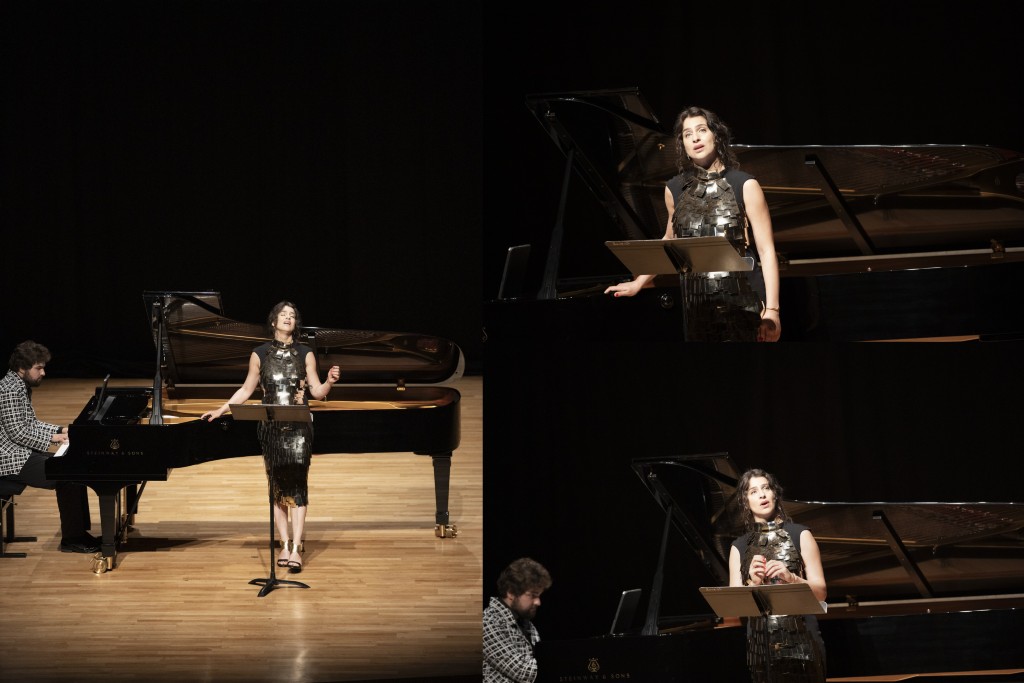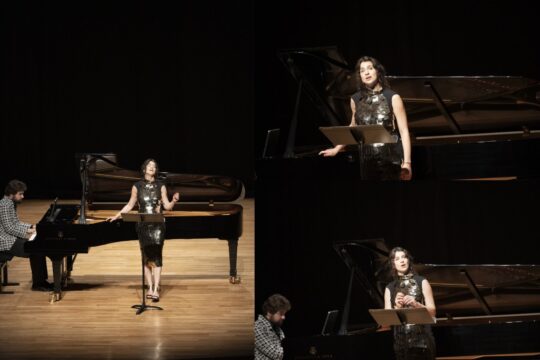For her debut at the Aix-en-Provence Festival, Lithuanian soprano Asmik Grigorian teamed up with her compatriot Lukas Geniušas to perform the impassioned romances of two composers linked by multiple aesthetic affinities, Tchaikovski and Rachmaninoff.
Asmik Grigorian, one of the most famous lyric singers of her generation, is also a peerless actress. The world’s most prestigious stages have welcomed her from La Scala in Milan (Lisa from The Queen of Spades) to the Bayreuth Festival (Senta from The Flying Dutchman) via London’s Covent Garden, the Vienna Opera, and the Berlin Opera… As a diva of the Salzburg Festival, she has successively embodied the title role of Salome, Chrysothemis in Elektra, Puccini’s Trittico and in a few weeks, she will take on the role of Lady Macbeth in Verdi’s Macbeth.
For this recital in Aix – taking place in the grand auditorium of the Darius Milhaud Conservatory, adjacent to the Grand Théâtre de Provence – she is accompanied by Russo-Lithuanian pianist Lukas Geniušas, who has also distinguished himself in the most prestigious concert halls and who has recorded an album dedicated to Rachmaninoff’s melodies with Asmik Grigorian(1).
Tchaikovsky opens the first part of the program with five excerpts from Six Romances: “Amid a noisy ball” (Tolstoï)(2), “Again alone, as before” (Rathaus), “No, only he who knows” (Mey/Goethe), “A tear trembles” (Tolstoï), “Don’t ask me” (Strougovchtchikov/Goethe) and an excerpt from Seven Romances : “I bless you, forests” (Tolstoï). After the “humorous scherzo” Opus 19 on the piano, the second part is dedicated to Rachmaninoff with “In the silence of a secret night” (Fet), “Do not sing, my beauty, in my presence” (Pushkin), “My child, you are as beautiful as a flower” (Plechtcheïev), “A dream” (Plechtcheïev), “Spring Waters” (Tyutchev), “Oh, don’t be sad!” (Apoukhtine), “I am waiting for you” (Davidova), “Twilight” (Tkhorzhevsky), “It’s good here” (Galina), “We shall rest” (Chekhov), “Dissonance” (Fet).
From the start, we are seized and charmed by the unique tone of voice, admirable vocal quality, inexhaustible breath, and depth of the singer’s interpretation. Her abilities seem limitless, with a power in the highs and a range of a rare equality from forte to pianissimi, in addition to an interpretive sobriety where exaltation, passion, and feelings are concentrated in the most accomplished manner.
Throughout the recital, the audience holds its breath, the atmosphere is unreal because we have the sensation of listening to the most beautiful voice in the world.
The pianist and the soprano share an musical intimacy priceless harmony. In the fourth melody, Asmik Grigorian’s voice surpasses the bounds of ethereality, corroborating her moving Salzburg performance of Suor Angelica in Puccini’s Trittico. How elegant ! What a singing lesson ! What clarity is brought out by the most beautiful instrument that can be heard, which happily harmonizes with the silky touch of the accompanying pianist.
Everything is pure music!
The fifth melody begins on a joyous rhythm that develops in a lyrical flight, befiting the range of proper of a spinto soprano, to ultimately leaves the piano the privilege of expressing the darker notes. In the sixth melody, after a recitative typical of Tchaikovsky’s works, we think of Tatiana in her exaltation for Onegin. The piano takes on the guise of an orchestra, and everything concludes with a superb sustained note. Lukas Geniušas alone finishes this first part with Tchaikovski’s “Humorous Scherzo,” in which the martial introduction proposes a series of notes, each with a very precise sense, with a delicate, almost supernatural art. The instrument is on par with a singer with its ethereal piani and impressive accents culminating in a prodigious “virtuosissimo.”
In the second part dedicated to Rachmaninoff, Asmik Grigorian fully showcases her lyricism with a voice that radiates complete fullness. There are no ‘blank phases’. The flawless homogeneity of the vocal line never betrays even the slightest vibrato.
The superb warm and iridescent colors unfurl their full allure, while the mezza-voce passages prove dizzyingly sublime, underscoring just how much this skilled artist has reached a level of perfection that few achieve. These melodies also reveal a naturalness in interpretation where nothing appears contrived or ‘manufactured’. This extraordinary artist sings as effortlessly as she breathes, and the transitions between softness and power are never artificial. The sustained notes are nothing short of miraculous, demonstrating absolute mastery of the art of singing, without the need to employ any effect that could potentially distort it.
The high notes are akin to pure pearls. Everything seems effortless in her lyrical commitment as it is expressed without the need for superfluous gestures but with an ideal simplicity in service of the music.
The sixth melody is delivered with a wonderful innocence and a masterful ‘art of speech’ barely whispered, which ultimately exudes an ineffable emotion, and all this with an incredible economy of means. Here is a performer who reaches peaks by brushing the heavens with exceptional introspection coupled with a sublime art of phrasing. Her crescendos are astouding and the lyricism she deploys is hard to describe with actual words : One might say, that new words would need to be invented to describe such an extraordinary artist .
The concert concludes, following the pianist’s performance of an excerpt from Tchaikovski’s Opus 12, with four Rachmaninov romances. Here we find dreamy piani attacks and mastery of mixed voice that relies on a robust middle register and stunningly beautiful low notes, alternating with finely spun phrases sustained on an endless breath.
Notably, there is extreme caretaken in the pronunciation of each word. Listening to her, one hears all the lyrical roles in the repertoire that she sings or could sing, and one thinks of the definition of ‘soprano assoluta’ (akin to a Callas, albeit with a different color and timbre of voice). One can comprehend what she could bring to the works of Puccini or Richard Strauss, verismo or Slavic lyrical music – she is no doubt the ideal ambassador for these. But through these melodies, isn’t she expressing everything that opera, in its immense diversity, can potentially offer her ? It is beyond doubt that the entire repertoire is wide open to a performer of such exceptional caliber, who has been so richly endowed
This recital was undoubtedly an extraordinary revelation for all spectators, facing an artist whose whole being sings. This lieder program is indeed worth a full opera, as certainly, in an hour and a half, Asmik Grigorian has vastly surpassed anything one can hear, placing her singing at the pinnacle of excellence.
Christian Jarniat
9th July 2023
(1) Published under the title name “Dissonance” in March 2022
(2) Name of the poem’s author
Traduit en anglais par Cécile Day



